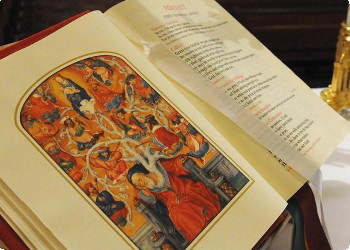Whatever you bind on earth shall be bound in heaven; and whatever you loose on earth shall be loosed in heaven
24 AUGUST (Mt 16,13-20)
The man that lives in the flesh of sin, according to the flesh of sin, also has a mind of flesh and of sin. With it he pretends to enter into the purest truth of his God, read his Word and by interpreting it, to observe his works and offer others the meaning of the mystery. This claim is pure madness. For the heavenly things is also necessary a heavenly mind. For spiritual things is necessary a spiritual heart. For the things of God we need that it is God the one to read and interpret them.
You can read, understand and interpret God, his Word, his eternal and divine mystery in its purest revelation. However, it is necessary that our mind is illuminated by the powerful divine light of the Holy Spirit of the Lord. This light is not given to everyone, but only to those who live according to the Spirit, are in the Spirit and are in the Word of the Gospel. You live according to the Gospel, in the highest charity and mercy, in the its most profound and enveloping righteousness and you are in the Holy Spirit. The Holy Spirit that is in the spiritual man, in the man of the Gospel, enlightens the mind so that it understands and warms the heart for it to adhere to the truth with more firmness of will.
The interpretation of Scripture does not belong to any scientific method. It belongs to the Spirit of God. The Spirit suggests from time to time the means of access to the sacred text, of which he is the sole Author and the only interpreter. Either you walk in the Word, living it all every day, or you are barred from its deeper knowledge. Without the Spirit of the Lord you remain in the letter, you do not enter into the mystery. You look out at its periphery, but you do not enter into its heart. Like Moses, you see it from far away, from the mountain, but you do not enter into it, you do not enjoy the vision from near.
However, the Lord has done something divinely great, amazing and beyond human reach. He constituted a man, Peter, perpetual guarantor of the truth of his Word, his truth and his mystery. Whether He is a sinner or a saint, just or unjust, unfair or pious, impious or a true worshiper, lover of the Church or even her enemy, whether he builds her with his virtues or destroys it with his flaws it does not matter; he possesses an infallible charisma of truth. He is always in possession of the key that opens to the truth and closes to falsehood. With this key he will always show what the real Jesus Christ is and with the same he will always say where the false Christ hides.
When Jesus went into the region of Caesarea Philippi he asked his disciples, “Who do people say that the Son of Man is?” They replied, “Some say John the Baptist, others Elijah, still others Jeremiah or one of the prophets.” He said to them, “But who do you say that I am?” Simon Peter said in reply, “You are the Messiah, the Son of the living God.” Jesus said to him in reply, “Blessed are you, Simon son of Jonah. For flesh and blood has not revealed this to you, but my heavenly Father. And so I say to you, you are Peter, and upon this rock I will build my church, and the gates of the netherworld shall not prevail against it. I will give you the keys to the kingdom of heaven. Whatever you bind on earth shall be bound in heaven; and whatever you loose on earth shall be loosed in heaven.” Then he strictly ordered his disciples to tell no one that he was the Messiah.
That is how the use of this key was regulated by the very Supreme Pontiff in communion with the whole Church: “Therefore we, by staying true to the tradition received from the beginnings of the Christian faith, for the glory of God our Saviour, for the exaltation of the Catholic religion and for the salvation of Christian peoples, with the approval of the sacred Council proclaim and define dogma revealed by God that the Roman Pontiff, when he speaks ex cathedra, that is when he exercises his supreme office of Pastor and Teacher of all Christians, and by virtue of his supreme Apostolic authority defines a doctrine concerning faith and morals; he binds the whole Church, by the divine assistance promised to him in the person of blessed Peter, enjoys that infallibility with which the divine Redeemer willed his Church were accompanied in defining the doctrine concerning faith and morals: therefore such definitions of the Roman Pontiff are immutable in themselves, and not by the consent of the Church.“
Virgin Mary, Mother of the Redemption, Angels and Saints make us spiritual men.





